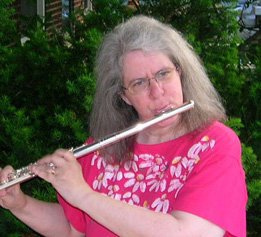Is music therapy something that you would be interested in pursuing?
If yes, aside from the proper credentials, according to Linda, you would need to have “a love of music and be proficient in an instrument (or voice) that would be conducive to the healing environment.”
This week I had the honor of interviewing Linda Grobman, MSW, LSW, CMP, who is the founder, publisher and editor of The New Social Worker. Linda is also the editor of Days In The Lives Of Social Workers: 54 Professionals Tell “Real-life” Stories From Social Work Practice and other social work books.
Linda is also involved in providing therapeutic music services to chronically, critically, terminally, and temporarily ill people of all ages. This post will focus on the fascinating world of music therapy, the first part of the interview.
A subsequent post will provide the valuable career advice that Linda was so kind as to share based upon her expertise in the social work career development field. Not surprisingly, Linda’s twitter handle is @newsocialworker.
So without further ado, Linda, how did you decide you wanted to become a social worker?
I was involved in a lot of volunteer work as a teenager, so being involved in the community was always a big part of my life. My undergrad degree was in another helping profession–music therapy–and at some point, I wanted to broaden the scope of my professional life.
I started looking for jobs, and it seemed that every job that looked interesting to me listed MSW as a requirement. So, I began to look into what social work really was, and discovered that this was exactly the right fit for me. I could do direct practice, community work, even writing (another interest of mine) as a social worker.
Can you tell us about your work in providing therapeutic music services and what led you to become interested in this particular area?
Yes, I would love to talk about that! I started taking music lessons (piano) in third grade. Then, in sixth grade, I joined the school band and started playing the flute. This has been a major part of my life from that time on.
And as I said before, my undergrad degree was not only a music degree, but a music therapy degree. Music therapy has been a recognized profession since about 1950. About 4-5 years ago, though, I heard about some musicians who played music at the bedside for nursing home residents, and I thought it sounded really interesting and could be a way for me to get back into some direct practice.
I started researching (this time, on the Internet), and I found out that there was an entire movement of therapeutic musicians that started around the 1990s. I found the Music for Healing and Transition Program (MHTP), a national program that trains and certifies musicians to provide live therapeutic music at the bedside.
It’s different from music therapy. I entered MHTP’s training program in 2007 and completed it in 2008, so now I am a Certified Music Practitioner. I am trained to provide live therapeutic music to people in hospice, hospitals, nursing homes, and other settings. I work with a nursing home and a hospice, and I LOVE it!
And not surprisingly, I am now the editor of MHTP’s newsletter! AND I am an advisor for MHTP students, so you can see, the interest in mentoring and career development, and the interest in writing/editing…well, it all ties together.
What are the parts of your work within the therapeutic music area that you find most enjoyable?
I have found ways to have the flexibility to do things that I really love. I absolutely love to play the flute(s). As a therapeutic musician, I can play the flute as a service to other people. It is rewarding and fun. I learned a whole new approach to music and to being of service.
What career advice would you offer to upcoming MSW graduate students who would be interested in being employed within the field of therapeutic music services?
They would need to get some additional training to do this. The MHTP program, for example, requires taking five weekend modules, completing readings, and doing an internship.
Of course, they would need to have a love of music and be proficient in an instrument (or voice) that would be conducive to the healing environment. If they are interested in music therapy, they would need to get the appropriate credentials for that.
We published an article in The New Social Worker: David’s Harp: Bringing Healing Through Music that talked about social workers who use music, and we found quite a few who are trained in both social work and a therapeutic music modality.
Thanks so much, Linda for providing us with this interesting glimpse of the therapeutic music world.
What are your thoughts about music therapy?
Photo Credit: D Sharon Pruitt
Tie Dye Rainbow Swirl Wallpaper




Therapeutic music sounds like a wonderful way of providing comfort. Could you explain how therapeutic music differs from music therapy?
Thanks!
Here’s a page that explains a little about the differences between the two:
http://www.therapeuticmusician.com/faq.html
I also wanted to add that there is board certification for music therapists, and you can find info about the music therapy profession and board certification here;
http://www.cbmt.org/
Music therapy requires a degree in music therapy from an approved program, internship, and a certification process similar to social work licensing. Music therapists work with clients in groups and individually in a wide variety of settings/situations to work toward specific therapeutic goals using music (live music, recorded, listening, creating, performing, etc.) to reach those specific goals. A music therapy degree is a music degree that includes the full range of music courses, as well as a full range of courses in therapeutic topics/techniques.
Therapeutic musicians generally have a less extensive and different training process and are trained specifically to provide one type of service–live therapeutic music at the bedside for patients/clients in a variety of settings, including hospice, hospitals, nursing homes, and others. This is done on a 1-to-1 basis and the musician is not providing a performance or entertainment, but rather a therapeutic service using the intrinsic value/power of music.
This is not a complete explanation, but hopefully gives you a sense of some of the differences.
Thanks, Dorlee, for the opportunity to discuss this!
Linda
Oh, also, if you take a look at the article from THE NEW SOCIAL WORKER referenced near the end of the interview (above), it talks about the differences between music therapy and therapeutic music! The article is at:
http://www.socialworker.com/home/Feature_Articles/Professional_Development_%26_Advancement/David%27s_Harp%3A_Bringing_Healing_Through_Music/
Dorlee, thanks for bringing us another great interview. We have such a diverse group of people and talents in our profession!
I really enjoyed hearing the specifics of Linda’s career path, and plan on checking out the links to The New Social Worker Online and MHTP.
Have a good weekend!
Thanks so much, Mike 🙂 Linda was a great interviewee!
It is wonderful how there are so many different paths that one can take within the social work/psychology arena – all of which enable one to make a meaningful difference in the lives of others.
Best,
Dorlee
HI Dorlee – you have very creative choices of people to interview! I would love to know more about the psychology behind using music as a way of healing and soothing. I believe in it intuitively; but would love to hear a second interview with Linda to hear more details about how she interacts with patients while providing music, and the effects of music on the brain that creates comfort and peace for people. Fascinating subject! Thank you.
Terry Del Percio
@WorkIntegrity
Hi Terry,
I’m so glad that you enjoyed this interview and I love the additional questions that you’ve come up with!
I will make sure to share your questions with Linda. Perhaps she may be able to provide you with some info about the psychology behind using music as a way of healing within this forum.
Thanks so much for your enthusiastic feedback,
Dorlee
Dear Dorlee,
I think this was wonderful and that music is one of the most healing tools we have available to us.
Thanks for bringing us great information.
Warm regards,
Lauren
Dear Lauren,
Thanks so much for your kind feedback.
Have you ever used music as a healing tool with any of your clients? If yes, I’d love to hear one example…
Thanks so much for your kind feedback.
Warm regards,
Dorlee
Terry,
There is both psychology and physiology behind it. There are some really good sources on this…one is the book THE POWER OF SOUND by Joshua Leeds, which explains a lot of the science behind therapeutic use of music. Another fascinating book about music and the brain is MUSICOPHILIA by Oliver Sacks.
As a therapeutic musician, I have a minimal amount of verbal interaction with the client. I introduce myself and explain to the person a little about what I do (if I have not seen the person previously), assess whether they WANT music, and assess how the music might help him/her. As I play, I am assessing the person’s response and adjusting what and how I play accordingly.
Linda
Fascinating way to blend social work and music. Thanks!
And once more illustrating all the amazing things one can do with an MSW.
Hi Nancy,
Thanks so much for visiting and sharing your thoughts 🙂
Best,
Dorlee
You are doing something important with music therapy. We should all pitch in and let as much people know about it! I know a few adult day care centers who haven’t heard of this. Thank you so much for everything you do.
Thanks so much for your feedback, Alissa!
I would love to know more about music therapy!!! What other advice would you give to young adults going into college about this career path??
I’m so glad that you enjoyed this interview. For more information, you can check out, http://www.dorleem.com/2012/04/music-therapy-healing-through-music.html, http://www.musictherapy.org as well as http://www.musictherapymaven.com/how-to-become-a-music-therapist/
Hoping this helps!